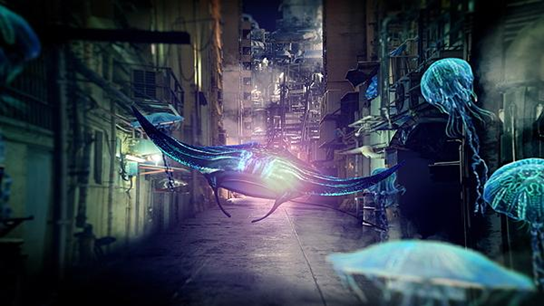This article previously appeared on Crossfader
In this Crossfader series, our intricate and complex rating system will tell you definitively whether new television pilots are worth your valuable time. We call it: HIT OR SH**.
I was originally going to open this by saying that I was unclear as to why Amazon thought the catalog of Philip K. Dick was the ideal fodder for prestige television adaptation. BLADE RUNNER is a severely sexed-up version of Dick’s ‘68 novel DO ANROIDS DREAM OF ELECTRIC SHEEP?, sure, but I foolishly thought that I’d be hard-pressed to name another successful adaptation that had its genesis in the mind of the late author. First I discovered that THE MAN IN THE HIGH CASTLE had a strong “Based On.” Then I looked further into it and discovered that TOTAL RECALL, MINORITY REPORT, A SCANNER DARKLY, and even THE ADJUSTMENT BUREAU all owed their concepts to Dick. Egg on my face, I’m still happy to report that ELECTRIC DREAMS is a functional-at-worst continuation of the work of one of science fiction’s most prominent voices.
Considering that it’s an anthology series based on Dick’s lesser-known short stories, tonal and narrative mileage varies. One thing I can say off the bat is that ELECTRIC DREAMS does a commendable job of offering us a diverse range of science fiction themes and subgenres. Speculative fiction, paranoid techno-thrillers, and straight-no-chaser spaceships and aliens all get their time in the sun here, and considering there’s no real attempt to craft an overarching connective tissue of any sort, viewers can simply pick and choose which tales interest them the most without any recompense. I went for the comparatively more grounded ones for my initial assessment, landing on “Real Life,” “Kill All Others,” and “The Father Thing,” taking a sample of the more classical genre trappings with the buzzing, Bryan Cranston-starring “Human Is.” “Real Life” deals with two individuals in different timelines, both of whom believe they’re in the dream of the other, “Kill All Others” features a man who seems to be the only one receiving threatening political messages from a radical candidate, “The Father Thing” involves a boy’s beloved dad becoming possessed by an alien consciousness, and “Human Is” is another personality-swapping yarn detailing the story of an unloving husband who goes to fight aliens on a foreign planet and returns entirely changed.

Grounded!
I land somewhere in the middle on how disjointed each episode is. On one hand, I generally believe in the anthology format and think it can do wonders for genre fare, especially horror. On the other hand, I’ll never say no to a little interstitial, and it would be nice to have come up with some way to connect the segments, even with an umbrella theme, tone, or moral message. To be fair, some of the stories make use of similar narrative archetypes (ie the two possession tales mentioned above), but this is never referenced or acknowledged to any degree. Despite perhaps a vague wariness of accelerationist technology, which has been present in practically every literary science fiction outing since the genre’s inception, everything is mostly self-contained, which makes the highs higher and the lows lower.
The majority of the episodes I checked out are stellar adaptations, turning Dick’s more esoteric musings into digestible chunks of thriller-adjacent casual viewing. “Kill All Others” perhaps feels a bit too obvious considering how aggressively it leans into a presidential candidate that believes in othering, but features two visibly overweight and unconventionally attractive characters as its core protagonist team, which is something science fiction has never smoothly integrated before in a popular outlet. Expanding the demographic for who sci-fi can reach and represent is a strong foot forward, especially considering Dee Rees is at the director’s helm, and its oppressive atmosphere of citizen surveillance and pressure to blend in with the herd is familiar and rotely effective.
“Human Is” will depend on your tolerance for big, dumb sci-fi set pieces, but Cranston handles his role with restraint and panache. Topped off with a notably higher production value than some of the other cuts, it’s refreshing to be treated to a solid take on Dick’s dabbling in the nerd-friendly traditional signs and signifiers of sci-fi. My personal favorite, “The Father Thing,” though heavily indebted to INVASION OF THE BODY SNATCHERS, features a strong cast of children who realize that their parents are being replaced by violent alien personalities. With a knock-out performance from Greg Kinnear and an exciting third act, I’d probably recommend this one or “Kill All Others” for your first stab at ELECTRIC DREAMS.

The show would work equally well as just a really cool screensaver
“Real Life,” however, blows chunks, and it’s a strong mark against the show’s overall existence. This feels like the fedora-tipping I expected when I heard that Philip K. Dick’s bibliography was getting the silver screen treatment. As an author his penchant for detailing existential dread and ruminations on humanity is enjoyable, but characters sitting around trading philosophical theories about the differences between dreams and reality is most pointedly not interesting television. Director Jeffrey Reiner makes the iffy decision to considerably change the plot and characters of Dick’s original short story while ratcheting up all the internal conflict to 11, leaving something that feels like a college lecture on post-humanism as opposed to the murder tale (?) that it’s apparently supposed to be. It’s an inclusion of an episode like this that brings into question the curatorial capabilities of ELECTRIC DREAMS; as we’re starting to see with the Stephen Kingaissance, not every word that comes from the mouth of a respected author is a good one, and the series could have easily benefited from including another story or eliminating a 10th episode entirely.
Considering its fractured presentation and the wildly different stories on display, reaching a definitive conclusion on ELECTRIC DREAMS is somewhat difficult. Ultimately, I think I err on the side of proclaiming it worth a shot. If you’re truly disappointed in this most recent season of BLACK MIRROR, which is seems like anyone with a respectable opinion most certainly is, this could provide the antidote you’re looking for in small doses. It’s not exactly bingeable considering the length of the episodes and some of the heady concepts on display, but when it sticks with tales of encroaching technological omnipresence, it manages to trigger enough pleasure centers to keep you interested in clicking around. Read the synopses, find something that interests you, and give it a try.
Verdict: Hit
ELECTRIC DREAMS is available to watch in its entirety on Amazon Prime
















Comments